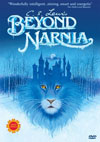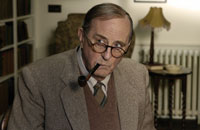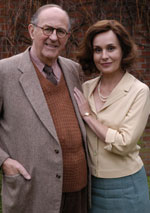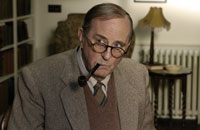The Chronicles of Narnia: The Lion, The Witch and The Wardrobe was a smashing holiday success at the box office. Not only did Aslan leave a giant gorilla named Kong in his wake, he also ultimately overtook a famous boy wizard in the standings.
Narnia, which releases to DVD today in fullscreen, widescreen, and a special 2-disc edition, recently passed Harry Potter and the Goblet of Fire to become the 24th-highest grossing film ever at the U.S. box office. Its current domestic total is fast closing in on the $300 million mark, while its international total has exceeded $700 million.
It’s indeed one of the major films of recent years, and the DVD release is certainly one that will become a part of many home libraries starting this week.
 |
But there’s another new Narnia film that is also worth a look: C.S. Lewis: Beyond Narnia, which premiered on the Hallmark Channel in December, right when Aslan was hitting the theaters. The Faith & Values Media production is an insightful hour-long “docudrama” that examines the life of the man who penned the Chronicles of Narnia.
Anton Rodgers plays the role of Lewis in Beyond Narnia, which explores the inspiration behind the Chronicles and other Lewis works. Written and directed by Norman Stone (who also directed the award-winning BBC version of Shadowlands), the film depicts Lewis’s faith journey from atheist to believer, and the role that others—including J.R.R. Tolkien—played along the way.
The second half of the film delves more into Lewis’s relationship with Joy Gresham, the American woman with whom he would fall in love and eventually marry. Gresham, played here by Diane Venora, died of cancer three years after their wedding, prompting a time of agonizing sorrow which Lewis ultimately chronicled in A Grief Observed.
Lewis adopted Joy’s young sons, Douglas and David, who continued living with the author until moving out on their own. Today, Douglas Gresham is the principal overseer of the Lewis estate, and he served as a consultant on the film, The Lion, The Witch and The Wardrobe.
Beyond Narnia also includes an interview with Gresham, who provides more insight into his father-in-law. Here are some excerpts from that interview:
Did Lewis speak much about his works at home, particularly Narnia?
Douglas Gresham: Yes and no is the best answer to that, because we talked about Narnia quite often, but always as though it was a real place. And when I came back from it, I might be asked slightly humorously if I had seen any fawns or what were the activities. We didn’t go into deep meaningful discussions about Narnia. It was as though we accepted the place as real and just around the corner all the time, and we might stumble into it at any moment. It was almost a family game in a way.
Some say that Lewis was not as deliberate in using Christian themes in his books as some believers would like to believe. How did he feel about using seemingly Christian symbolism throughout the Chronicles?

Gresham: I think that Jack was well aware of the fact that his own rich Christian faith infused everything that he wrote. Also I’m quite convinced that after he wrote some of the Narnian chronicles, he saw far more of his own Christian faith in there than he had anticipated in the first place. But I don’t think he ever sat down with the intention of writing a Christian book, or writing some kind of instructional book. Later on, he realized that’s probably what he had done, but I don’t think he started out to do that.
You’ve got to remember that the Narnian chronicles, and particularly The Lion, The Witch and The Wardrobe, are infused with the great mythologies of man. From ancient Greece, Rome, the Norse mythology, Hindu mythology and so forth, it’s all in there, and of course the true myth, the story of the Gospel of Jesus Christ is also in there as well. But you’ve got to remember that Jack loved mythology, and in fact, his own journey to Christ came via mythology. So I guess it’s to be expected that it would all turn up in his enjoyable writing of the Narnian chronicles.
What would you most like people to know about C.S. Lewis, the man, as opposed to C.S. Lewis, the author?
Gresham: I think one of the things that’s most important to remember about Jack and people don’t remember was his joyfulness, his great sense of humor, his warmth and compassion and his personality … Jack was a man who was enormously aware of his own sinfulness but equally aware of his salvation from it, and that allowed him to live a life of Christian joy. That never comes across in the books about him and the movies and so forth. He was a great, fun man to be with. You couldn’t be with Jack for very long before roaring with laughter.

What did your mom and Lewis like to do as a couple?
Gresham: My mother and Jack liked to do lots of different things as a couple. They liked to explore, they’d get a hired car with a driver and they’d take off into the country side, and go to places that they enjoyed. But at home most of the time they would sit together and read poetry together, they would read good prose to each other, they would play Scrabble. But of course Scrabble was a bit exceptional for them because they had their own rules. They would take one Scrabble board and the letter tiles from two sets of Scrabble, and then they would play Scrabble allowing all known languages with a fictional or factual. So you could put down the word Nazgul for example and get triple word score or whatever on it, you’re doing all right. At the same time you could use a word from Ming Chinese if you could prove that it existed you could get away with it.
Once in a while one of them would try to con the other and there would be a challenge, and some adjudicator would be called. They asked me and I always told them to ask Warnie [Jack’s brother] because I haven’t got a clue. And Warnie, on one occasion if I remember rightly, it was some disputed word that nobody could prove existed and Warnie was fairly convinced that Jack was trying it on. He penalized Jack so many points for trying a word that he couldn’t prove existed, and he penalized my mother for crowing over the decision or something like that. Watching them play Scrabble was a treat in itself, they would fill the entire board with letter tiles.
A free discussion guide for Beyond Narnia is available here. For more from Douglas Gresham about Lewis and about the theatrical release, read our earlier interviews.
Copyright © 2006 Christianity Today. Click for reprint information.










